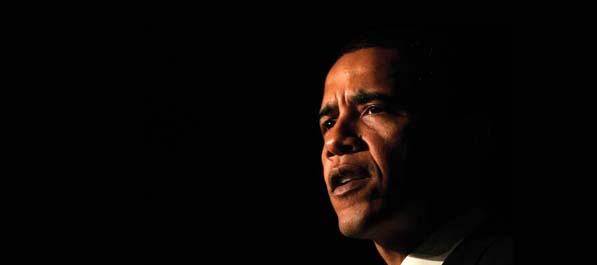Magazine
COVER STORY
Burma and Obama
By AUNG ZAW
JAN — FEB, 2009 - VOLUME 17 NO.1

(Photo: AFP)
When the regime crushed protests in 2007, she called UN Secretary-General Ban Ki-moon to discuss the situation—a rare approach by a US first lady. She even addressed a challenge to regime leader Snr-Gen Than Shwe to step down. Though no longer the first lady, Laura Bush isn’t quitting, and she’s expected to continue working on the Burma issue.
In 2008, Bush and his wife traveled to Thailand, where Bush met prominent exiled Burmese, and Laura Bush visited the Burmese border, where she met refugees and humanitarian workers. The couple recently met a monk and a blogger from Burma.
Min Zin, a US-based Burmese academic and a contributor to The Irrawaddy, agreed that the Burmese people are indeed fortunate to have the support of both Bush and his wife, who has been a real driving force in keeping Burma at the top of the political agenda.
“It was very much like a personal issue,” he said. The only mistake the Bush administration had made, he said, was to push the Burma issue on to the agenda of the UN Security Council, where a US-initiated resolution was vetoed by China and Russia.
Moves to bring the Burma issue before the Security Council “should be maintained only as a threat,” Min Zin said.
Some Bush critics thought his disastrous Iraq venture had led a number of policy makers in the West working on the Burma issue to oppose US policy on Burma because they were concerned about his foreign policy agenda and growing anti-Americanism.
 |
| US President George W Bush signs the renewal of import restrictions on Burma and the Tom Lantos Block Burmese JADE (Junta’s Anti-Democratic Efforts) Act of 2008 in the Oval Office of the White House in Washington in July 2008. (Photo: Reuters) |
Obama’s vice-president, Joseph R Biden, is no stranger to the Burma issue. While chairman of the Senate Foreign Relations Committee, he played a prominent role in shaping US policy on Burma.
Biden spearheaded the Tom Lantos Block Burmese JADE (the Junta’s Anti-Democratic Efforts) Act 2008, which was signed into law by President Bush on July 29, 2008. The bill renews an act of 2007 restricting the import of gems from Burma and tightening sanctions on mining projects.
Biden said in presenting the bill that it was a “tribute to my dear friend Tom Lantos who worked tirelessly on behalf of human rights for the people of Burma.”
Biden added: “We must continue Tom’s work. Working together with the international community, including the Association of Southeast Asian Nations, the EU, India and China, I look forward to the day when a democratic, peaceful Burma will be fully integrated into the community of nations.”
The Tom Lantos Block Burmese JADE Act marks the outline of a strong US policy on Burma. The act has three aims: to impose new financial sanctions and travel restrictions on the leaders of the junta and their associates; to tighten the economic sanctions imposed in 2003 by outlawing the importation of Burmese gems to the US; and to create a new position of special representative and policy coordinator for Burma.
Michael Green, who formerly served on the National Security Council and is currently an associate professor at Georgetown University, was nominated for the post, but the changeover at the White House has put his confirmation on hold.
The proposed US special envoy would have the task of working with Burma’s neighbors and other interested countries, such as those within the EU and Asean. The envoy’s mission would also involve developing a comprehensive approach to the Burma crisis, including pressure, dialogue and support for nongovernmental organizations providing humanitarian relief to the Burmese people.
While Burmese dissidents want Obama to maintain a tough Burma policy, they may want to see some tactical changes and a better strategy.
The prominent Burmese opposition leader Win Tin, in congratulating Obama on his election victory, urged the US to adopt a multilateral approach toward Burma. “We want the US to work with the international community and the United Nations,” he said.
Win Tin, who spent 19 years in a regime prison, warned the US not to compromise with the junta.
« previous 1 | 2 | 3 | 4 next page »
more articles in this section
